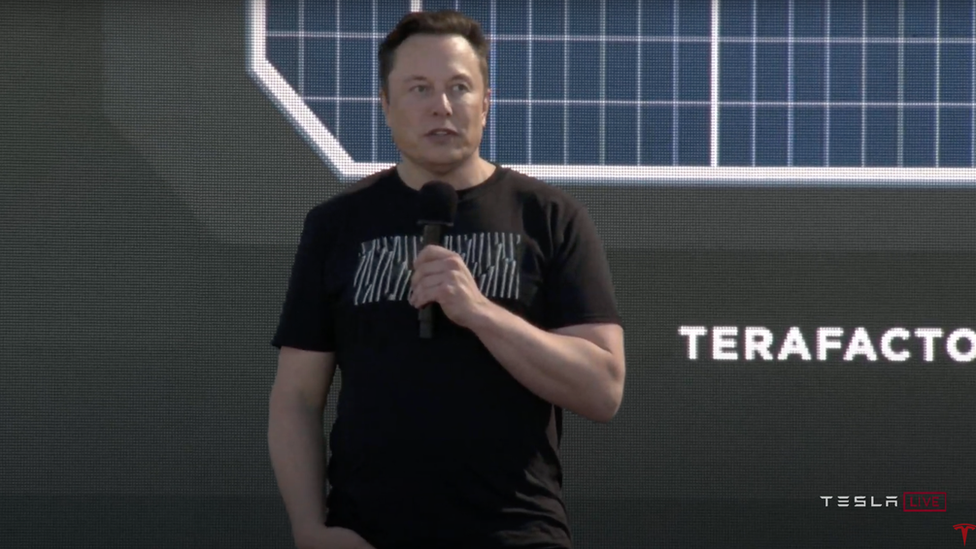Tesla founder Elon Musk has announced technology that he says will make Tesla batteries cheaper and more powerful.
At a live presentation that Mr Musk labelled ‘Battery Day’ he also teased the possibility of a $25,000 (£19,600), fully-autonomous Tesla “in about three years time”.
“This has always been our dream to make an affordable electric car,” he said.
But the news didn’t excite investors and $50bn was wiped off its stock market value.
The main announcement was Tesla’s new larger cylindrical cells. It was claimed the new batteries will provide five times more energy, six times more power and 16% greater driving range.
But the technology announced is likely to take years to implement.
Tesla’s approach includes integrating the battery so that it forms part of the structure of the vehicle, thereby reducing the effective weight of the battery.
“This restricts choice and poses a risk for the security and resilience of the UK’s future digital networks,” the statement added.
It comes ahead of the government introducing a Telecoms Security Bill this autumn, around the same time as which the government will also be publishing its telecoms diversity strategy.
The bill will make the prohibition on purchasing new Huawei equipment from the end of this year, and the requirement to remove all existing Huawei equipment from 5G networks by 2027, a legal obligation.
A task force to develop and implement the strategy will be led by Lord Livingston of Parkhead, a Conservative peer and the former chief executive of BT Group, who will be joined by senior executives within the telecoms sector to ensure that the government is listening to the industry’s needs.
Lord Livingston said: “It is vital that we position ourselves for the next generation of technology, particularly 5G, by having a wide choice of secure, innovative and high quality suppliers.
“I look forward to chairing this team of experts from industry and academia who can provide advice to government as to how it can best achieve these aims,” Lord Livingston added.
Although the digital secretary Oliver Dowden described the task force’s role as to “break through the barriers stopping suppliers from entering the UK,” there are currently no obvious third companies who could replace Huawei.
NCSC already requires that mobile operators use at least two vendors to provide the radio antennas in their network, meaning from the end of this year the UK mobile companies will effectively be required to purchase Nokia and Ericsson equipment.
Part of the task force’s work will be to enable other companies who provide Radio Access Network (RAN) equipment, such as Samsung, to be interoperable with the core equipment used in the core of the 5G infrastructure.
Speaking to Sky News, Matt Warman MP, who has the infrastructure portfolio under the Digital Secretary, said he did not expect that the key cause of the UK’s change in approach – the US decision to restrict Huawei’s computer chips – would be reversed.
“The most important thing to say is that we’ve taken the right decision for this country,” Mr Warman said.
“If I look across the Atlantic, actually this is an issue where – while the language might be different – there is considerable bipartisan support that is in line with the decision we’re taking,” he added.
The speech took place in front of 240 shareholders – each sitting in a Tesla Model 3.
Central to cheaper Teslas are innovations in the way the company designs batteries – radically improving their efficiency.
Prof Stanley Whittingham – who was awarded the Nobel Prize in Chemistry last year for his work on lithium-ion batteries – told the BBC that “tackling all the opportunities is high risk, but high pay-off”.
“Many of us have suggested the same steps are necessary, but Tesla has the investment and will to make it happen. Not sure anyone else is willing to do this,” he said.
Mr Musk also announced that as well as purchasing batteries from Panasonic and LG Chem – Tesla itself would begin to make them.
In April last year, Musk himself revealed problems with sourcing Panasonic batteries used in its Model 3 Tesla.
One expert said scaling up would be “challenging”.
“Even with really experienced car manufacturers, we tend to see a very high scrap rate of production in the first couple of years,” said Casper Rawles, head of price assessments at Benchmark Mineral Intelligence.
Mr Rawles also warned that so much of the content of the battery is expensive metals – “You can only reduce the cost down to a point”.
Four consecutive quarters of growth have helped Tesla’s share price soar and it is now the most valuable car company in the world.
This is despite criticisms of Elon Musk that some of his technological advances have been exaggerated.
Earlier this month, customer group Consumer Reports released a damning report about Tesla’s automated driving services. The research concluded that “for now, full self-driving capability… remains a misnomer”.
And in July, Mr Musk said Tesla would be able to make its vehicles completely autonomous by the end of this year. The statement was met with scepticism by industry insiders.
Tesla’s boss however announced that a “beta” version of the full Autopilot software would be available “in a month or so”.
Musk is no stranger to glitzy and sometimes bizarre public demonstrations.
Earlier this month he unveiled a pig with a coin-sized computer chip in its brain to demonstrate his ambitious plans to create a working brain-to-machine interface. –
bbc.com


